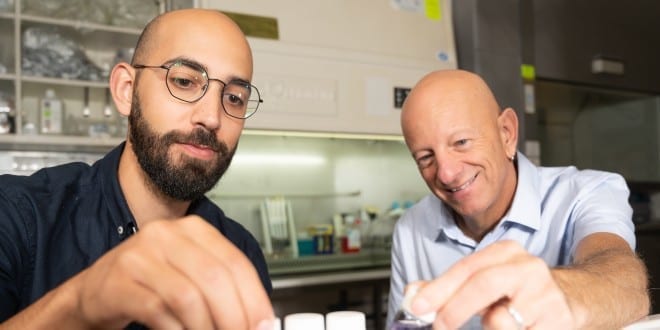An “artificial nose” that continuously detects a variety of bacteria has been invented by a multidisciplinary team at Ben-Gurion University (BGU) of the Negev in Beersheba. This feat was deemed elusive until now.
There are numerous potential applications for such an artificial nose including ensuring food quality by detecting spoiled food; identifying bacteria in hospitals and public buildings; performing diagnostic tests to detect disease through breath; speeding up testing of lab samples; identifying “good” vs. pathogenic bacteria in the microbiome; identifying poisonous gases; homeland security and environmental monitoring.
Bacteria are known to release varied volatile molecules whose types and concentrations are dependent on the type. Bacterially produced volatile compounds such as alcohols, aldehydes, ketones and others have been used as microbial biomarkers, and bacterially emitted volatile metabolite mixtures have been used as distinctive “odor profile” tools for identifying bacteria.
Optical and chemo-resistive gas sensing methods have been also used for bacterial analysis, exploiting specific biomarkers. The fundamental problem that limits these vapor-based bacterial detection schemes is the fact that they cannot be used for continuous monitoring since samples need to be collected – usually by hand – and analyzed off site.
“Together with collaborators in the software and information systems engineering department here at Ben-Gurion University, we invented an artificial nose based on unique carbon nanoparticles (“carbon dots”) capable of sensing gas molecules, particularly detecting bacteria through the volatile metabolites they emit to the air,” explained lead researcher Prof. Raz Jelinek.
A machine-learning algorithm supplies excellent predictability, both in the case of individual gases and for complex gas mixtures, they wrote. The artificial nose uses chemical reactions and electrodes to “scent” bacteria. Technically, it records the capacitance changes induced upon binding vapor molecules onto interdigitated electrodes (IDEs) coated with carbon dots exhibiting different polarities. Machine learning can be applied to train the sensor to identify different gas molecules, individually or in mixtures, at high accuracy.
Their findings were published in the prestigious peer-reviewed journal Nano-Micro Letters under the title “Sniffing Bacteria with a Carbon-Dot Artificial Nose.”
Jelinek, BGU’s vice president for research and development. is also a member of the chemistry department and the Katz Institute for Nanoscale Science and Technology.
Other researchers on the team included: Nitzan Shauloff, Dr. Ahiud Morag, Dr. Seema Singh, and Ravit Malishev of the Department of Chemistry and Prof. Lior Rokach, chair of the department of software and information systems engineering.
The shortcode is missing a valid Donation Form ID attribute.






